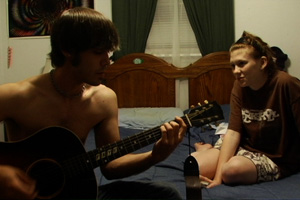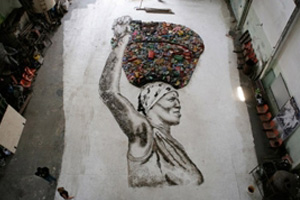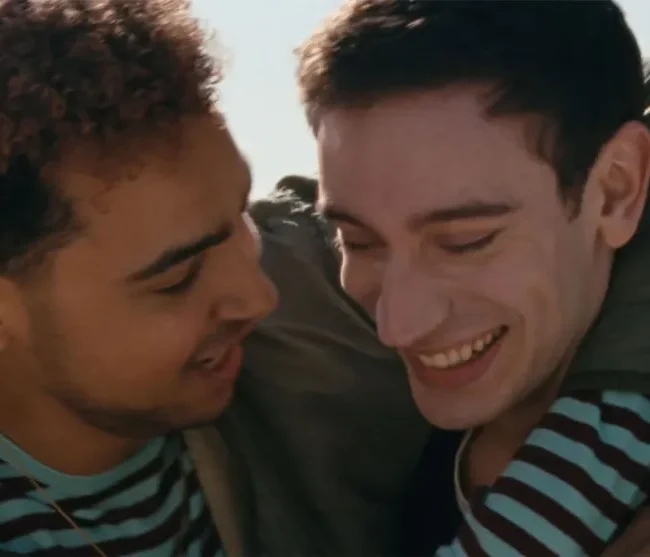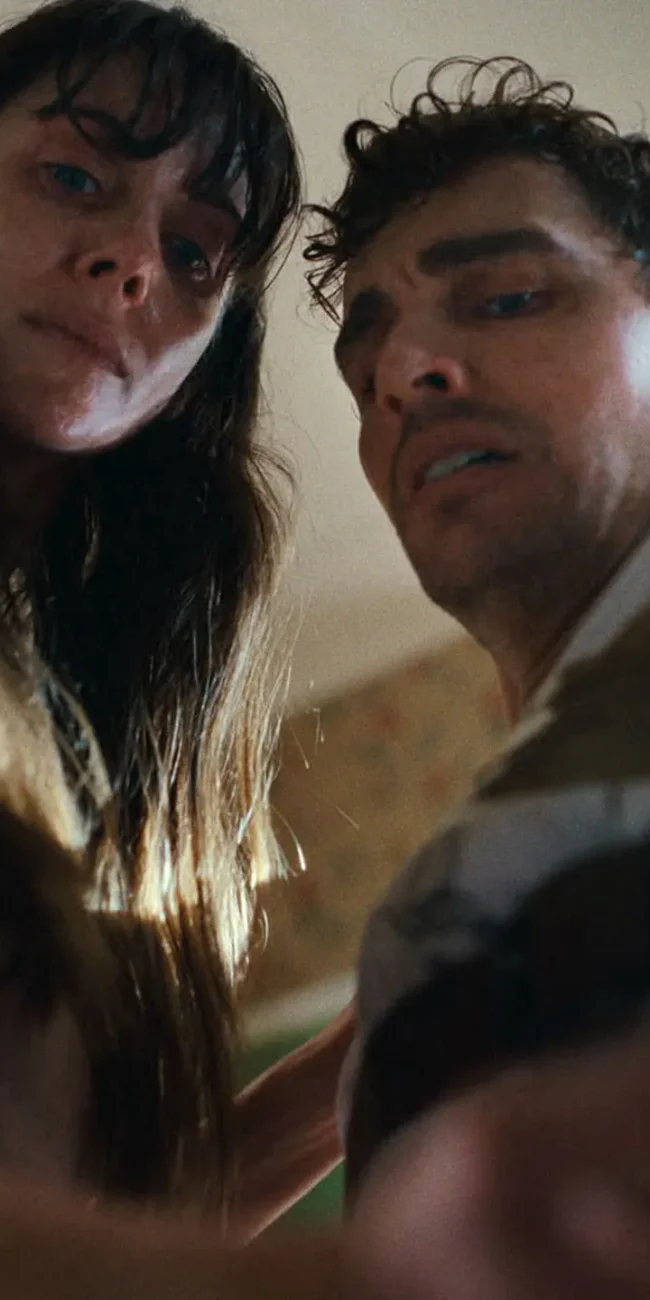TRUE/FALSE 2010 PART TWO – A Festival Apart
 (If you haven’t already, read Part One of Pamela Cohn’s wrap-up right here.)
(If you haven’t already, read Part One of Pamela Cohn’s wrap-up right here.)
This year, the T/F team watched about 700 films sent to them for consideration for their carefully curated festival of just 40 selections. The programming ethos is a complex one, as it is for most festivals that pride themselves on offering challenging work that will rarely be seen outside the circuit—hard choices that have very little to do with anything except celebrating great work and serving it up to small town audiences hungry for such fare.
What the program intends to offer (turning down many, many excellent films in the process) is a “stunning array of approaches.” The “There are no small stories” tagline is indicative of the celebration of a singular vision in telling true stories and bringing it to a small community like Columbia. Makes sense since the way they tend to see the world is distinctly human-scale, a place where individual, lonely satellites looking for sensible terrain can commune together in dark cinemas for a long weekend of great film. And then talk about what they saw over giant plates of fried things and local artisanal beer. Heaven.
 The Invention of Dr. NakaMats (directed by Kaspar Astrup Schröder) — Leave it to a Danish filmmaker to find a man like this and make a film about him. The 80-year-old doctor has over 3,300 inventions under his stylish belt, including the floppy disk and Love Jet potion, a “sex enhancer” for women. Dr. NakaMats is a joyously hilarious character and it’s a pleasure to spend time with him as he explains his life’s work. Schröder shoots a blithe day-in-the-life portrait of this wacky, brilliant man. This played, appropriately, with Brad Beesley’s new 14-minute short, Mr. Hypnotism, the story of Ron Dante (uh-oh, website overload!).
The Invention of Dr. NakaMats (directed by Kaspar Astrup Schröder) — Leave it to a Danish filmmaker to find a man like this and make a film about him. The 80-year-old doctor has over 3,300 inventions under his stylish belt, including the floppy disk and Love Jet potion, a “sex enhancer” for women. Dr. NakaMats is a joyously hilarious character and it’s a pleasure to spend time with him as he explains his life’s work. Schröder shoots a blithe day-in-the-life portrait of this wacky, brilliant man. This played, appropriately, with Brad Beesley’s new 14-minute short, Mr. Hypnotism, the story of Ron Dante (uh-oh, website overload!).
It Felt Like a Kiss (directed by Adam Curtis) — The latest work from the director of The Power of Nightmares is a wonder. A lot of us had to skip the next movie we planned to watch and go lie down for a bit in a quiet place to recover. In It Felt Like a Kiss—described by festival co-founder Paul Sturtz as a “psycho-archaeological dig”—Curtis, like some diabolical alchemist, presents America at its nightmarish worst, sewing together stunning visual montages of archival footage accompanied by a pulse-pounding soundtrack. It is an explosive, pugilistic piece of filmmaking, kind of like psychedelic, electric-shock therapy for the senses. Watching this reminded me of my experience watching Ken Russell’s Tommy for the first time, especially Tina Turner’s “Gypsy Acid Queen” number. Shattering, haunting, electrifying, definitely not for the weak of heart.
 Kati With an I (directed by Robert Greene) — Kati is Greene’s much younger half-sister and he has been shooting footage of her since she was a little girl. In this über-intimate portrait, a very “small story” indeed, Greene captures Kati, a teenager about to graduate high school and already engaged to her childhood sweetheart whom she plans to marry “in five years,” over the course of three emotional days. Her future, in many ways, is set in this vivacious girl’s mind—she has it all planned out in the way we, as little girls, used to do when we could describe in minute detail our dream wedding day. The problem is, little boys dream of other things, even while professing undying love and devotion, wailing romantic songs along with the radio behind the wheels of pickups in the dopey earnest way teenagers do. We see many of Kati’s dreams disintegrate as she encounters the irrevocable onslaught of young adulthood, its expectations and endless responsibilities, which come way, way too soon. Kati With an I has the same poetic pangs of angst and bewilderment as Matthew Porterfield’s beautiful Putty Hill, providing resonant collective memories of what it’s like to be an unsophisticated child “on the verge.” Greene’s and Sean Price Williams’s cinematography is a revelation, lush and sensuous. And Greene’s editing is both sophisticated and visceral, enhancing the deeply emotional journey of their young subject with all of the pain-filled splendor she can muster for the camera. Remarkable that they made a feature film this nuanced and fulgent with just 14 hours of footage.
Kati With an I (directed by Robert Greene) — Kati is Greene’s much younger half-sister and he has been shooting footage of her since she was a little girl. In this über-intimate portrait, a very “small story” indeed, Greene captures Kati, a teenager about to graduate high school and already engaged to her childhood sweetheart whom she plans to marry “in five years,” over the course of three emotional days. Her future, in many ways, is set in this vivacious girl’s mind—she has it all planned out in the way we, as little girls, used to do when we could describe in minute detail our dream wedding day. The problem is, little boys dream of other things, even while professing undying love and devotion, wailing romantic songs along with the radio behind the wheels of pickups in the dopey earnest way teenagers do. We see many of Kati’s dreams disintegrate as she encounters the irrevocable onslaught of young adulthood, its expectations and endless responsibilities, which come way, way too soon. Kati With an I has the same poetic pangs of angst and bewilderment as Matthew Porterfield’s beautiful Putty Hill, providing resonant collective memories of what it’s like to be an unsophisticated child “on the verge.” Greene’s and Sean Price Williams’s cinematography is a revelation, lush and sensuous. And Greene’s editing is both sophisticated and visceral, enhancing the deeply emotional journey of their young subject with all of the pain-filled splendor she can muster for the camera. Remarkable that they made a feature film this nuanced and fulgent with just 14 hours of footage.
Those Who Remain (Los Que Se Quedan) (directed by Juan Carlos Rulfo and Carlos Hagerman) — There have been many films made about the Mexican emigrant experience from this side of the fence, but Rulfo and Hagerman’s beautiful, highly romantic film is set in Mexico with the people left behind. Absent loved ones—husbands, wives, sons, daughters, any of those that are able—have crossed over to the States to earn enough money to support entire families back home. With graceful strokes, the filmmakers create a vision of this homeland that many are forced to leave, and where many are forced to live, sometimes, whole lifetimes estranged from their closest relatives. Like the most emotionally resonant films do, Those Who Remain celebrates its subjects with a full arsenal of cinematic metaphor, and mines vérité riches with patient and loving observation. The film won the big doc prize at the ’09 Los Angeles Film Festival.
 Waste Land (directed by Lucy Walker) — Walker is an intrepid filmmaker. She tells bold, adventurous stories from very small, circumscribed worlds (The Devil’s Playground, Blindsight), her subjects the disenfranchised, the outcasts, the “invisible.” She also makes films for the big screen. In her latest, we accompany her to the massive garbage dumps of Brazil with Brazilian-born artist Vic Muniz, as he travels from his workspace in Brooklyn to the world’s largest landfill on the outskirts of Rio. His latest project involves a collaboration with a few of the catedores, or garbage pickers, who live and work in the Jardim Gramacho, using the collected trash as material for his portraits, a source material he’s used for inspiration for his art pieces for years. Walker’s camera captures the surprising spirit and strength and joy of these people in wondrous and deeply moving ways in a place most of us would be hard pressed to bear for half a day. Man, the Brazilians are tough! This film, not surprisingly, won the Audience Award at both the Sundance festival and the Berlinale.
Waste Land (directed by Lucy Walker) — Walker is an intrepid filmmaker. She tells bold, adventurous stories from very small, circumscribed worlds (The Devil’s Playground, Blindsight), her subjects the disenfranchised, the outcasts, the “invisible.” She also makes films for the big screen. In her latest, we accompany her to the massive garbage dumps of Brazil with Brazilian-born artist Vic Muniz, as he travels from his workspace in Brooklyn to the world’s largest landfill on the outskirts of Rio. His latest project involves a collaboration with a few of the catedores, or garbage pickers, who live and work in the Jardim Gramacho, using the collected trash as material for his portraits, a source material he’s used for inspiration for his art pieces for years. Walker’s camera captures the surprising spirit and strength and joy of these people in wondrous and deeply moving ways in a place most of us would be hard pressed to bear for half a day. Man, the Brazilians are tough! This film, not surprisingly, won the Audience Award at both the Sundance festival and the Berlinale.
There are several more films I saw that will be débuting or playing at other festivals in the near future, so we’ll circle back and weigh in on them at a later date. Some have already been reviewed on this site.
But if you find yourself with a chance to see any of these, do: Circo by Aaron Schock, Familia by Mikael Wiström and Alberto Herkovits, Greetings from the Woods by Mikel Cee Karlsson, Last Train Home by Lixin Fan, The Mirror (Lo Specchio) by David Christensen, The Red Chapel by Mads Brügger (playing next in New York as part of New Directors/New Films), Restrepo by Sebastian Junger and Tim Hetherington.
— Pamela Cohn











